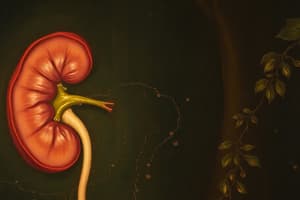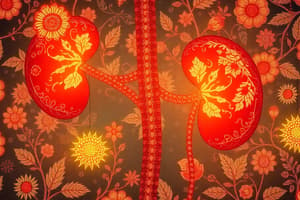Podcast
Questions and Answers
What is the main role of the kidneys in regulating blood volume?
What is the main role of the kidneys in regulating blood volume?
- Assisting in the conversion of vitamin D into an active form for bone formation
- Producing hormones like erythropoietin to stimulate RBC maturation
- Conserving water in stressful situations to ensure good cardiac output (correct)
- Regulating blood osmolarity by adjusting the solute-to-water ratio
What is the consequence of poor kidney function in regulating potassium (K+) levels?
What is the consequence of poor kidney function in regulating potassium (K+) levels?
- Excessive excretion of K+ causing electrolyte imbalance
- Increased K+ reabsorption leading to hypertension
- Inability to excrete K+ leading to cardiac and other problems (correct)
- Accumulation of K+ in the urine causing kidney stones
Which hormone, produced by the kidneys, aids in blood pressure regulation?
Which hormone, produced by the kidneys, aids in blood pressure regulation?
- Erythropoietin
- Calcitriol
- Renin (correct)
- Aldosterone
What is the primary function of the kidneys in extreme situations regarding blood glucose level?
What is the primary function of the kidneys in extreme situations regarding blood glucose level?
What is the purpose of the slight negative charge in the basal lamina of the glomerulus?
What is the purpose of the slight negative charge in the basal lamina of the glomerulus?
What is the purpose of the albumin-creatinine ratio in the context of glomerular filtration?
What is the purpose of the albumin-creatinine ratio in the context of glomerular filtration?
What is the role of mesangial cells in the glomerulus?
What is the role of mesangial cells in the glomerulus?
What is the effect of vasoconstriction of the afferent arteriole on glomerular filtration rate (GFR)?
What is the effect of vasoconstriction of the afferent arteriole on glomerular filtration rate (GFR)?
How does increased resistance in the efferent arteriole affect glomerular filtration rate (GFR)?
How does increased resistance in the efferent arteriole affect glomerular filtration rate (GFR)?
What is the myogenic response in the context of autoregulation in the nephrons?
What is the myogenic response in the context of autoregulation in the nephrons?
What is the formula for calculating glomerular filtration rate (GFR)?
What is the formula for calculating glomerular filtration rate (GFR)?
What is the purpose of autoregulation in the nephrons?
What is the purpose of autoregulation in the nephrons?
What is the most prominent cation in extracellular fluid?
What is the most prominent cation in extracellular fluid?
What happens to cells in dehydration?
What happens to cells in dehydration?
What can hypotonic hydration, such as only drinking water without electrolytes, lead to?
What can hypotonic hydration, such as only drinking water without electrolytes, lead to?
What stimulates the hypothalamic thirst center?
What stimulates the hypothalamic thirst center?
What is the other name for ADH?
What is the other name for ADH?
What is responsible for the filtration of substances in the nephrons?
What is responsible for the filtration of substances in the nephrons?
What is the most prominent anion in extracellular fluid?
What is the most prominent anion in extracellular fluid?
What is the condition when there is balanced neutrality between cations and anions in plasma?
What is the condition when there is balanced neutrality between cations and anions in plasma?
What does hypertonic saline do to osmolarity?
What does hypertonic saline do to osmolarity?
What is the condition when osmolality in the intracellular and extracellular fluid is equal?
What is the condition when osmolality in the intracellular and extracellular fluid is equal?
What do isotonic, hypertonic, and hypotonic solutions have different effects on?
What do isotonic, hypertonic, and hypotonic solutions have different effects on?
What does intracellular fluid have very little of and a high amount of?
What does intracellular fluid have very little of and a high amount of?
Which cells regulate glomerular filtration rate (GFR) by signaling juxtaglomerular (JG) cells to adjust afferent arteriole diameter?
Which cells regulate glomerular filtration rate (GFR) by signaling juxtaglomerular (JG) cells to adjust afferent arteriole diameter?
What regulates afferent arteriole diameter and renin release through the tubuloglomerular feedback mechanism?
What regulates afferent arteriole diameter and renin release through the tubuloglomerular feedback mechanism?
Which of the following mediators regulate afferent arteriole diameter and renin release as part of neural control?
Which of the following mediators regulate afferent arteriole diameter and renin release as part of neural control?
What is released from myocardial cells to help lower blood pressure?
What is released from myocardial cells to help lower blood pressure?
Which of the following substances are filtered during the process of glomerular filtration?
Which of the following substances are filtered during the process of glomerular filtration?
In the context of kidney function, what is the primary function of the renin-angiotensin-aldosterone system (RAAS)?
In the context of kidney function, what is the primary function of the renin-angiotensin-aldosterone system (RAAS)?
Which medications primarily affect kidney function and blood pressure regulation?
Which medications primarily affect kidney function and blood pressure regulation?
What is the effect of aldosterone on the kidneys?
What is the effect of aldosterone on the kidneys?
Which of the following substances undergoes both filtration and reabsorption in the kidneys?
Which of the following substances undergoes both filtration and reabsorption in the kidneys?
What is the role of penicillin in the process of urine formation?
What is the role of penicillin in the process of urine formation?
Which of the following substances is primarily used to estimate glomerular filtration rate (GFR) in clinical practice?
Which of the following substances is primarily used to estimate glomerular filtration rate (GFR) in clinical practice?
What is the approximate percentage of cardiac output that the kidneys take up?
What is the approximate percentage of cardiac output that the kidneys take up?
Which of the following is responsible for red blood cell production in dialysis patients?
Which of the following is responsible for red blood cell production in dialysis patients?
What is the approximate percentage of kidney function loss that becomes a problem?
What is the approximate percentage of kidney function loss that becomes a problem?
What is the primary reason for the increased risk of bladder cancer due to smoking?
What is the primary reason for the increased risk of bladder cancer due to smoking?
Which substance plays a crucial role in bone health due to its production by the kidneys?
Which substance plays a crucial role in bone health due to its production by the kidneys?
Where are most nephrons located within the kidney?
Where are most nephrons located within the kidney?
What is the approximate size of the kidneys?
What is the approximate size of the kidneys?
Which of the following is a part of the urine formation process in the kidneys?
Which of the following is a part of the urine formation process in the kidneys?
What is the primary role of the kidneys in fluid balance?
What is the primary role of the kidneys in fluid balance?
What is the impact of phosphate excretion by the kidneys on hypertension?
What is the impact of phosphate excretion by the kidneys on hypertension?
What is the primary reason for monitoring kidney function when taking medications?
What is the primary reason for monitoring kidney function when taking medications?
What is the primary reason for the role of the kidneys in fluid balance?
What is the primary reason for the role of the kidneys in fluid balance?
Flashcards are hidden until you start studying
Study Notes
Kidney Regulation of Blood Pressure and Glomerular Filtration
- Myogenic response: arteriolar vasoconstriction at high BP, vasodilation at low BP
- Macula densa cells regulate GFR by signaling JG cells to adjust afferent arteriole diameter
- Tubuloglomerular feedback mechanism: adenosine and nitric oxide regulate afferent arteriole diameter
- Neural control: SNS and other mediators regulate afferent arteriole diameter and renin release
- Extrinsic mechanisms: SNS and RAAS regulate blood pressure through various pathways
- RAAS function: renin, angiotensin, aldosterone, and their effects on blood pressure regulation
- ANP function: released from myocardial cells to help lower blood pressure
- Filtration of plasma components: inulin, creatinine, glucose, urea, and penicillin
- Glucose reabsorption and filtration in urine
- Urea reabsorption and filtration in urine
- Penicillin filtration, reabsorption, and secretion in urine
- Medications affecting kidney function: ACE inhibitors, ANG II receptor blockers, and their side effects.
Anatomy and Function of the Kidneys
- Kidneys excrete phosphate and can lead to hypertension
- Dialysis patients lack erythropoietin and require EPO for red blood cell production
- Kidneys play a role in bone health due to calcitriol production
- Smoking increases the risk of bladder cancer due to carcinogens
- Medications require kidney function monitoring for proper excretion
- Kidneys are located in the retroperitoneal area, with the right kidney lower than the left
- Kidneys are the size of a bar of soap and take up 10-20% of cardiac output
- Renal function decline becomes a problem after losing 75% of kidney function
- The urine formation process involves nephrons, collecting ducts, and calyces
- Nephrons have a complex blood supply and specialized structures
- Most nephrons are in the cortex, while juxtamedullary nephrons reach into the medulla
- Kidneys play a crucial role in fluid balance, with 2/3 of water being intracellular and 1/3 extracellular
Studying That Suits You
Use AI to generate personalized quizzes and flashcards to suit your learning preferences.




